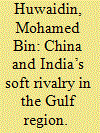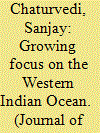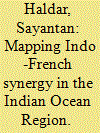|
|
|
Sort Order |
|
|
|
Items / Page
|
|
|
|
|
|
|
| Srl | Item |
| 1 |
ID:
186141


|
|
|
|
|
| Summary/Abstract |
China and India have significant interests in the Gulf region. Their ties with the region are not limited to just the economic domain but, in fact, go beyond it to include the security and political domains. Consequently, to protect their interests, China and India have been pursuing various policies to engage with the region. These policies have been linked to their long-time spatial and positional rivalry in Asia. This article argues that the China–India rivalry in the Gulf region can be classified as a soft rather than hard rivalry. Unlike their rivalry in the Indian Ocean, seen as a hard rivalry, in which both powers are trying to contain and counter the power and presence of the other, the essence of their rivalry in the Gulf region is geared towards each power looking to strengthen its interest and not to directly undermine the interests of the other.
|
|
|
|
|
|
|
|
|
|
|
|
|
|
|
|
| 2 |
ID:
186140


|
|
|
|
|
| Summary/Abstract |
Given various intriguing intersections between geopolitical, geoeconomic, geostrategic, and geo-ecological trends, the Eastern Indian Ocean --especially the Bay of Bengal and its immediate maritime neighbourhood-- will no doubt retain its salience on the vibrant reserach agenda of Indian Ocean and Indo-Pacific studies. For reasons no less compelling, the Western Indian Ocean also demands and deserves serious engagement by both academia and policy makers. A bi-focal approach centered on the subcontinent, and one that is mindful of this intersectionality, is needed to ensure a holistic understanding of the vast and diverse Indian Ocean region; a region of interlinked yet distinct sub-regions.
|
|
|
|
|
|
|
|
|
|
|
|
|
|
|
|
| 3 |
ID:
186142


|
|
|
|
|
| Summary/Abstract |
France's formal accession to the Indian Ocean Rim Association (IORA), underlining its recognition as multilaterally engaged resident power in the Indian Ocean, has been warmly endorsed by India. In the context of shifting geopolitical landscape, a systematic examination of the prospects of Indo-French synergy in the Indian Ocean Region (IOR), and the wider Indo-Pacific, becomes of immense value. Historically, defense cooperation has been a domain of robust engagement between the two countries. The contours of their relationship now have further prospects of expansion. This paper analyses various facets of growing Indo-French synergy in the IOR, and argues that challenges not withstanding, both are well placed to further broaden and deepen their cooperation in the wider Indo-Pacific.
|
|
|
|
|
|
|
|
|
|
|
|
|
|
|
|
| 4 |
ID:
186143


|
|
|
|
|
| Summary/Abstract |
Tourism is the most important export-oriented economic activity in Mauritius. Climate change is predicted to exacerbate environmental degradation in coastal areas, where rapid tourism development is burdening the environmental attributes on which the island’s tourism depends. This research examines climate change risk perceptions among key stakeholders within the tourism sector in Mauritius. It also explores their perceptions of the public policies which guide the management of climate change, their policy preferences and the perceived barriers to an effective approach. The stakeholders consider climate change as being potentially catastrophic and as representing significant risks for tourism. However, the majority lacked awareness of climate change policies as well as the importance of adaptation in Mauritius, and viewed the current institutional approach as being inadequate or insufficient. Therefore, there is an imperative need for improved communication among tourism stakeholders and information about adaptation needs to be disseminated through sources perceived as being credible.
|
|
|
|
|
|
|
|
|
|
|
|
|
|
|
|
| 5 |
ID:
186144


|
|
|
|
|
| Summary/Abstract |
The United Nations Convention on Law of the Sea regime makes it incumbent upon the capturing state to effectively prosecute the apprehended pirates as per their domestic laws. Many states, including India, have not developed piracy-related domestic legislation; therefore, the domestic courts face various substantive and procedural challenges during trial. Indian judiciary relies on various criminal law statues to prosecute maritime pirates, none of which defines piracy as a crime in India. The Indian government has recently introduced the Anti-Maritime Piracy Bill, 2019. This paper seeks to examine the prosecution of maritime pirates in India and identify the existing gaps within the legal framework. Further, this paper discusses the Anti-Maritime Piracy Bill, 2019 in detail to determine if it can achieve effective prosecution of maritime pirates by filling in the gaps of the current Indian criminal law regime.
|
|
|
|
|
|
|
|
|
|
|
|
|
|
|
|
|
|
|
|
|